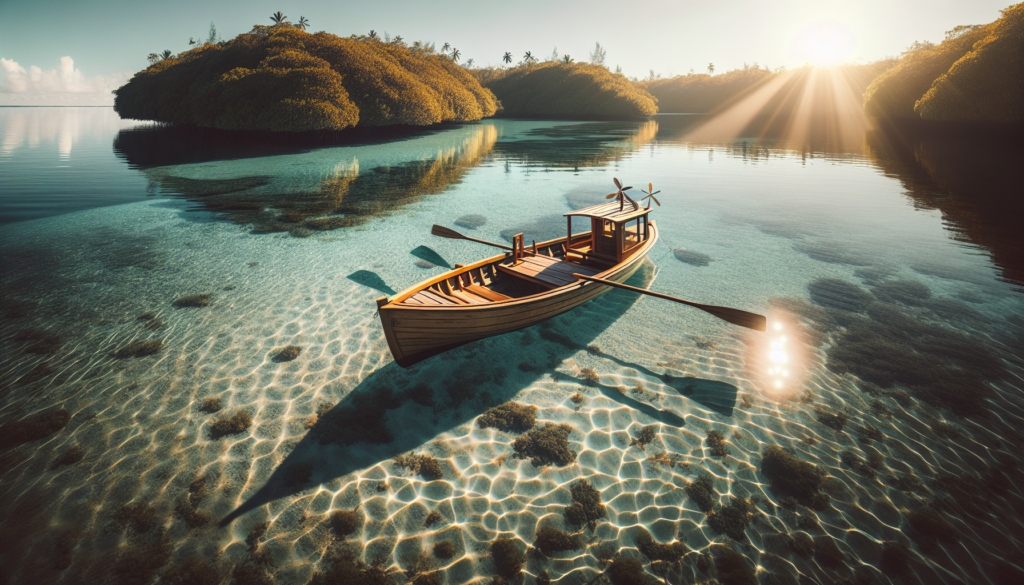As a boater, you carry a responsibility to preserve the delicate ecosystems that offer you so much joy and adventure. The article “Eco-Friendly Boating Practices in Shallow Water Environments” presents a wealth of knowledge for boating enthusiasts, addressing crucial practices that minimize harm to marine habitats. Expect to find useful strategies for safeguarding sea life in shallow waters, suggestions on organic cleaning products for your vessel, and navigation tips promoting lower fuel consumption. This comprehensive guide will not only enhance your boating experience but also help you contribute actively to the preservation of our aquatic environments.

Understanding the Impact of Boating on Shallow Water Ecosystems
Boating is a popular recreational activity that countless people around the globe enjoy. While it can be a lot of fun, it’s crucial to remember that boating can also have significant impacts on our environment, particularly on shallow water ecosystems. Let’s take a closer look at what’s happening beneath the water’s surface.
Effects of conventional boating practices
Many standard boating practices can unwittingly cause damage to aquatic habitats. Propellers can stir up sediment from the seabed, which not only disrupts the life there but also clouds the water, preventing sunlight from reaching the plants that need it. Excessive speeds can also lead to wake erosion, further damaging the shoreline and the habitat of countless species.
Role of boating in diminishing water quality
Boats that are not properly maintained pose a significant risk to water quality. Oil and fuel leaks from poorly maintained engines can seep into the water, causing pollution and harm to aquatic life. Additionally, careless waste disposal methods, such as tossing trash overboard, contribute to water contamination.
Impacts on aquatic life
All these practices can cause significant harm to the variety of life that calls these waters home. Disturbed sediments can smother creatures that live in the seabed, degraded water quality is a health hazard to all types of aquatic life, and physical damage from boat propellers can seriously injure or kill.
The Concept of Eco-Friendly Boating
With the increasing awareness of the environmental impact of boating, the concept of eco-friendly boating has emerged. This involves adopting new practices and technologies that minimize the harmful effects of boating on the environment.
Defining eco-friendly boating
Eco-friendly boating means being mindful of how our boating activities affect the environment and making efforts to minimize our impacts. It encompasses everything from the type of boat we use, how we maintain it, how we handle waste, to how we operate the boat on the water.
Benefits of adopting eco-friendly practices
Adopting eco-friendly practices can help preserve our precious water ecosystems for future generations. Moreover, many of these practices, like proper maintenance, can also enhance the performance of our boats and lead to cost savings in the long run. Plus, engaging in eco-friendly boating can give you the satisfaction of knowing that you’re doing your part to protect the environment.
Exploring the principle of sustainable boating
sustainable boating goes a step beyond eco-friendly boating. While eco-friendly boating focuses on minimizing harm, sustainable boating aims to ensure that our boating activities can be continued indefinitely without depleting or degrading the natural resources that we depend on. This would involve practices like using renewable energy sources, adopting circular economy principles, and promoting fairness and inclusivity in boating.
Eco-Friendly Vessel Choices
The type of boat you choose and how you maintain it plays a crucial role in minimizing your environmental footprint.
Environmentally-friendly boat models
New, environmentally-friendly boat models are becoming increasingly available. These include boats made from sustainable materials or designed to minimize wake and erosion. Electric-powered boats are also a fantastic alternative as they produce no exhaust and create minimal underwater noise, disturbing aquatic life a lot less.
Alternative fuels and energy sources
Beyond boat design, more sustainable fuels and energy sources can also significantly reduce the environmental impacts of your boat. Options include biodiesel, electric power, or even solar panels for auxiliary power.
Importance of boat maintenance in reducing impact
Regular maintenance remains essential to an eco-friendly boat. A poorly maintained engine not only consumes more fuel but can also leak oil and other harmful substances into the water. Keeping your boat in good shape ensures it runs efficiently, keeping harmful emissions to a minimum.

Waste Management Practices on Boats
Proper disposal of waste and trash
Your habits regarding waste can significantly impact the environment during your boating trips. Always ensure to carry a trash bag onboard and bring back all your waste for proper disposal on shore. Also, remember to recycle where possible.
Use of eco-friendly cleaning products
When cleaning your boat, choose eco-friendly products that break down naturally in the water instead of conventional cleaning products that may contain harmful chemicals.
Managing oil and fuel waste
Be mindful when refuelling or changing the engine oil. Spills can easily occur, causing water pollution. In case of an accidental spill, have absorbing materials ready to clean it up.
Protecting Aquatic Life During Boating
Observing wildlife from a safe distance
Humans and wild animals rarely mingle. So, it’s often exciting when we encounter wildlife during boating. However, remember to maintain a safe distance. Avoid disrupting their natural behaviours or causing them stress.
Avoiding areas with dense aquatic vegetation
Areas packed with aquatic plants are often rich habitats for a wide variety of species. Steer clear of such areas to avoid damaging plants or disturbing wildlife.
Practices to prevent propeller injuries to aquatic animals
Slow down in areas known to be populated by aquatic animals to avoid collisions. Additionally, consider using propeller guards or jet drives which are less likely to harm animals.
Boating Speed and Its Environmental Impact
Effect of high-speed boating on water bodies
High-speed boating can have several negative impacts on our environment. Large wakes can erode the shoreline, disturb nest sites of birds and other animals, and even damage other boats.
Setting appropriate speed in shallow waters
In shallow waters, it’s especially crucial to keep your speed down. High-speeds in such areas are more likely to stir up sediment from the seabed, potentially harming plant and animal life.
Benefits of slow boating
Boating slowly not only reduces your environmental impact but also can be a more pleasurable way to enjoy the water. It uses less fuel, creates less noise, and provides more opportunities to appreciate the surrounding nature.
Sustainable Fishing Practices for Boaters
Catch and release principles
Catch and release follows the practice of capturing fish and releasing them back into the water. This method not only preserves fish populations but also ensures future generations can enjoy the same fishing experience.
Using environmentally-friendly fishing gear
Choose fishing gear designed to minimize environmental harm. This includes using hooks that are easier for released fish to shed and nets that won’t continue to trap creatures if lost in the water.
Planning to reduce the impact of fishing trips
Fish responsibly by adhering to the daily limits and only keeping the fish you intend to consume. Also, consider joining fishing tournaments that donate catches to local charities.
Impact of Anchoring and Mooring on the Seabed
Damages caused by improper anchoring
Dropping anchor can lead to significant damage. Anchors can crush, scrape, and uproot seabed habitats, destroying plants and displacing animals.
Eco-friendly anchoring techniques
To minimize damage, use eco-friendly anchoring techniques like using a drift anchor or a temporary mooring buoy. Also, avoid anchoring in areas with dense plant life or known to have sensitive habitats.
Choosing suitable sites for anchoring
Finding the right site to anchor can help minimize environmental impacts. Look for sandy or muddy bottoms, which are more resilient and recover more quickly than places with abundant vegetation or coral reefs.
Education and Awareness for Eco-Friendly Boating
For eco-friendly boating to become the norm, education and awareness play a crucial role.
Importance of maritime education, training and rules
Maritime education and training should include modules on the environmental impacts of boating and ways to minimize them. Additionally, having clear and enforceable rules can help ensure all boaters follow eco-friendly practices.
Role of boating clubs and associations in spreading awareness
Boating clubs and associations can play a pivotal role in promoting eco-friendly boating among their members. They can organize workshops, talks, and other events geared towards raising awareness about the environmental effects of boating.
Initiatives for promoting eco-friendly boating
To encourage boaters to adopt eco-friendly practices, we can also offer incentives, such as discounts on docking fees for electric boats or organized events like clean-up paddles.
Regulations and Policies Supporting Eco-Friendly Boating
Existing regulations for boating in shallow waters
Existing regulations often include speed limits in shallow waters, guidelines for where and how to anchor, and mandatory boat maintenance checks. This can further help in preserving the aquatic ecosystems.
Role of authorities in promoting sustainable boating
Authorities also play a critical role in promoting sustainable boating by enacting and enforcing regulations, providing infrastructure for things like waste disposal and renewable energy options, and offering education and outreach programs.
Global initiatives towards eco-friendly boating
Across the globe, initiatives are being taken for eco-friendly boating. In many areas, new marinas are being designed with environmental considerations in mind, and efforts are being made to retrofit existing ones with eco-friendly facilities. This global movement aims to sustain our water bodies while continuing to enjoy the pleasure of boating.
In conclusion, uncovering the impacts of boating on shallow water ecosystems highlights the urgency of eco-friendly and sustainable boating practices. By making responsible choices, each one of us can play a part in preserving our beautiful and diverse aquatic ecosystems for boating adventures for generations to come. So, let’s raise the anchor, and set sail towards more responsible and eco-friendly boating practices.

